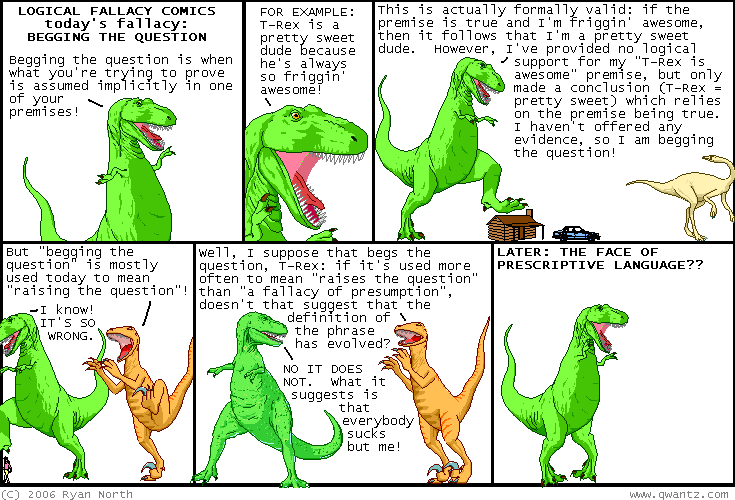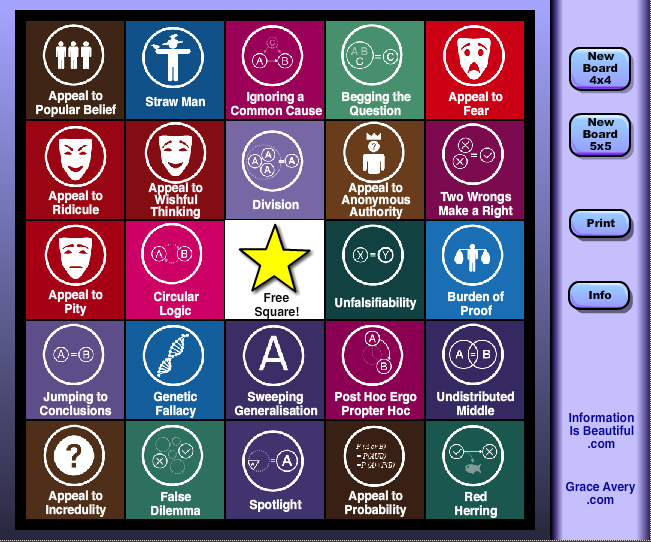
Image source: Dinosaur Comics
The bulk of my last posting was spent singing the praises of Mr. David McCandless; as anyone who has checked out any of his work before or since then can attest to, such accolades are/were more than justified.
Specifically, I loved his “rhetological” fallacies project, where he vizualized a colorful list of about 50 different rhetorical or logical fallacies, and created an unadorned yet arresting image to accompany each of them. Pretty cool stuff.
McCandless and his team from his amazing site, imformationisbeautiful.net, then demonstrated an exercise they called “rhetological bingo,” wherein he and his cohort listened to a politically charged speech, and identified each of the fallacies they spotted on the way by adding one of the colorful images to a layout that they described as a “matrix.” Visitors to the site are encouraged to download a high-res copy of the game to play themselves. Even cooler stuff, right?
As I finished writing the aforementioned blog, I thought to myself, “’rhetological bingo,’ why can’t I be that clever? You know what else would be really cool? If, instead of a matrix, rhetological bingo involved vizualized bingo cards? I could play a political speech/cartoon from You Tube on the big screen in the classroom, while all of my students, at their individual computers (or maybe in pairs) checked off rhetorical and logical fallacies as they spotted them on their respective bingo cards (Flash-powered, maybe?), until the inevitable ‘Bingo?!' At which point, the winning student(s) would run through their answers, explaining to all of us the portion of the speech that they thought constitued a fallacy?! Yes! That’d be awesome, and I totally rock for coming up with this totally new way to use these illustrations! Goddamn am I awesome!”
Then I googled “rhetological bingo” and scanned a few results down…
After a lifetime of coming up with great new ideas only to discover that they aren’t so new after all, you’d think I’d be used to the dejection that accompanies such discoveries, and that I’d cope accordingly. Nonetheless, this one took a little wind out of my sails:

Image credit: Graceavery Rhetological Bingo
Grace Avery has created a fantastic rhetological bingo platform, even better than the one I’d envisioned, utilizing the images and definitions from the McCandless project. Every bingo card comes up with different fallacy names and corresponding images in different orders; hovering over any of the images on any of squares causes a definition and example of the corresponding concept to pop up in an oh-so-engaging way!
My only criticism of this mashup would be that the attribution provided isn’t really as clear as it could be. A link to informationisbeautiful.com at the corner of the bingo card (see above) is the extent of her attribution (note that even that link only takes to you the site's homepage, where it's far from apparent that the rhetological fallacies project resides there). if I’d stumbled across Ms. Kelly’s game without prior knowledge of the original rhetological fallacies project, I would have assumed that the images and definitions were her own. Looking at her site in its totality, it's hard to give her the benefit of the doubt on this one. But what do I know? Nothing, except that I am going to be able to parlay this into part of a kick-ass lesson plan…with all due attributions, of course. ;)


Recent comments
2 years 29 weeks ago
2 years 44 weeks ago
2 years 44 weeks ago
2 years 50 weeks ago
3 years 4 weeks ago
3 years 4 weeks ago
3 years 4 weeks ago
3 years 6 weeks ago
3 years 6 weeks ago
3 years 6 weeks ago